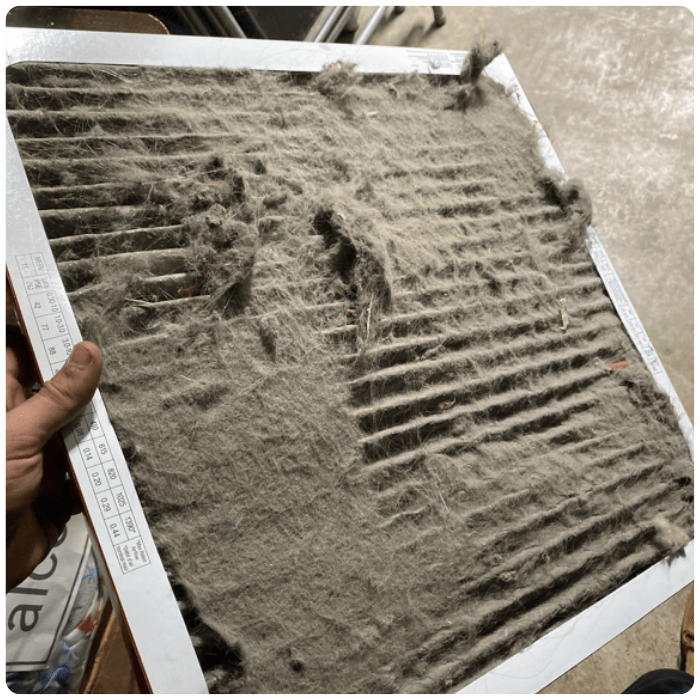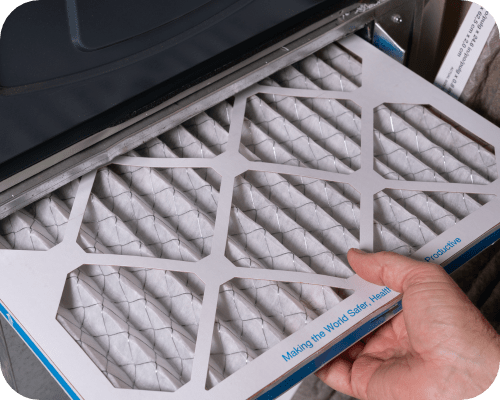Filtration
Filtration For Your HVAC System
Keeping the air in our homes clean and healthy starts with filtration. The majority of heating and cooling systems use some form of forced air. Whether it’s a heat pump, a ductless mini split, furnace, or air conditioner, most systems use a fan or system of fans to push air through a handler, where it’s then ducted throughout your home. During this process, air passes through a media filter at some point.
The purpose of this particular filter is to catch airborne irritants and particles before they pass through the system’s air handler and wind up being spread all over your home. Think dust. This is going to help keep you air cleaner and your home cleaner. A clean air filter will promote better airflow and increase the life of your system.
Changing the air filter for your HVAC system is simple, but often forgotten. If you go months without a replacement, your filter could become clogged and make the air in your home unhealthy to breathe. Filters will catch all sorts of airborne particles, such as:
- Bacteria, Dust, & Dirt
- Bacteria & Mold Spores
- Virus & Allergen Particles
- Odors & Pet Dander

What To Know About HVAC Filters
We recommend you replace the filters in your HVAC system once every 1-3 months. Not every space is the same, so not every space is going to require the same filter or the same frequency of replacement.
Here are a few facts that will help you learn a little more about filtration for your HVAC system:
Filtration Facts
- Filters Are MERV Rated 1 To 16 - MERV ratings measure the efficiency of a filter. The higher the rating, the smaller the particles it catches. Be sure to consult your HVAC technician, or your system manual to see what kind of filter you should use. Sometimes if you choose one with too high a rating it can restrict airflow and become a problem.
- Replace The Filter More Often In Homes With Children/Elderly/Breathing Impaired - If you live in a home with children, elderly people, or anyone with breathing issues like asthma, changing the filter more often may be the right move. We recommend you have a few filters on hand, and make sure to change them at the beginning of every season at a minimum.
- Replacing Filters Can Be A DIY Task - Changing your air filter is simple, and a task you should be able to take care of on your own. If you aren't sure how to change your filter, either ask an HVAC technician during routine service, or look up a video online. There should also be instructions in your HVAC system's manual.
- Clogged Filters Can Disrupt Your HVAC System - If you go for extended periods of time without changing the filter, it can become clogged. This causes poor airflow, and it can cause your system to get backed up. This can be a reason your heating or cooling system aren't performing the way they should.
Scheduling HVAC Service For Your Heating And Cooling Systems
Replacing the air filter is a task you can handle, and one that should be performed regularly. Another great way to ensure your system is clean and working properly is by scheduling routine HVAC maintenance. You should have your heating and cooling system inspected at least once a year, preferably before the winter or summer.
During your routine service, we will replace the air filter, and we’ll also show you how to replace the air filter on your own. We’ll answer any questions you may have about indoor air quality, the kinds of filters you should be using, or how well your HVAC system is holding up. If there’s a repair needed, we’ll let you know, and ensure you get the most years of service possible out of your system.
What Kinds Of Heating Systems Do We Work With?
We work with all sorts of different heating and cooling systems, from all different brands:
- Gas Furnaces
- Electric Furnaces
- Heat Pumps
- Ductless Mini Splits
- Boilers
- Air Conditioners


